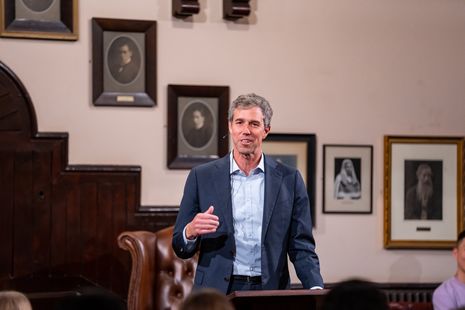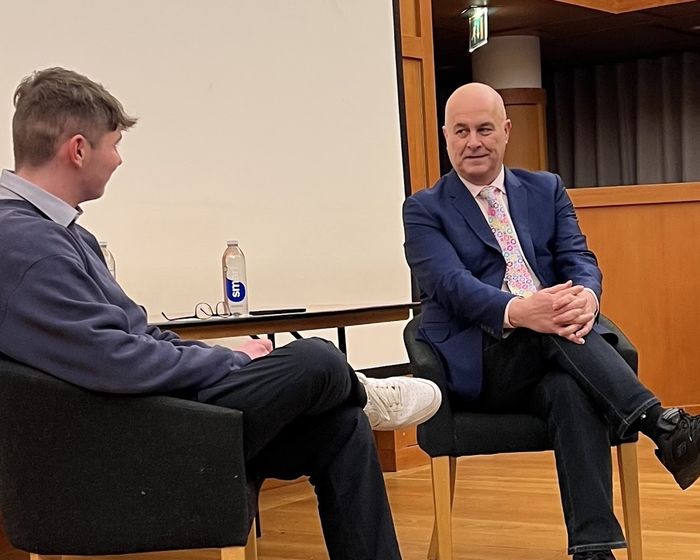Ending mass shootings and legalising heroin: Beto O’Rourke’s plan for a better America
On his first visit to England, the Texan Democrat spoke to Chris Patel about how systemic barriers prevent his country from solving its biggest issues

Many would consider Beto O’Rourke a political phenomenon. His soundbites have attracted worldwide attention, from when he was the only Democrat in the 2020 nomination to say, “Hell yes, we’re gonna take your AR-15”, to his viral response to a heckler following the Uvalde school shooting: “It may be funny to you, motherfucker, but it’s not funny to me.” However, his recent career has been characterised by failures, first losing the Presidential nomination, then losing the race to be Governor of Texas last year. But when I sat down with O’Rourke on his first visit to England, his spirit was unbroken.
O’Rourke affirms: “I’m very comfortable being in this fight for as long as it takes.” He hasn’t ruled out running for high office in the future because he sees America’s current situation as critical, and nowhere more so than in his home state of Texas. The state leads the country in number of people with no health insurance and number of school shootings, and, according to O’Rourke, Texas makes it harder than any other state to register to vote.
O’Rourke also informs me that Texas’ “number one provider of mental healthcare services right now is the county jail system” — many uninsured people with mental health conditions in Texas have to “ask to be arrested” to access proper care. O’Rourke’s views on drug use have also sparked controversy; he has called for the decriminalisation of opioids, including heroin. He explains his rationale to me:
“The United States incarcerates more of its own people than does any other country”
“The United States incarcerates more of its own people than does any other country [...] many of them there for nonviolent drug crimes [...] and disproportionately they happen to be black and brown Americans.” By treating drug abuse as a public health issue, rather than a crime, O’Rourke intends to help those who are “very often victimised by corporations who are operating legally within the United States”, pointing to the causes of the ongoing opioid epidemic.
High-profile school shootings, such as last May’s shooting in Uvalde, which killed nineteen students aged 9-11 and two teachers, have given Texas a bad name for gun safety. The issue could not be more urgent — three days after I spoke to O’Rourke, Texas saw another fatal school shooting, this time in Arlington. Furthermore, Greg Abbott, who beat O’Rourke to become Governor of Texas, signed into law in 2021 a bill that allows Texans to carry handguns without a licence or training. O’Rourke calls the current stalemate on gun control “a failure of our democracy” and blames it on “the diminishment of voting rights across the country.”
O’Rourke also blames barriers to voter registration for his loss in the gubernatorial election, arguing that if the 9.6 million eligible Americans who did not vote in 2022 had done so, he would have won. For O’Rourke, voter suppression is not just politically important, but historically essential to understanding today’s America. He points out that problems such as voter registration have been “going on in one form or another for over 150 years since Reconstruction, following the Civil War.” As part of his research for the book he wrote last year, We’ve Got To Try, O’Rourke went back through the archives and researched the stories of past Texans who had fought for their rights.
One figure O’Rourke profiled in his book was Dr. Lawrence Nixon, from O’Rourke’s home city of El Paso, who twice sued the state of Texas for banning African-Americans from voting in Democratic primaries. O’Rourke explains how these successful lawsuits, in 1927 and 1932, laid the foundations for the 1964 Civil Rights Act, which ended segregation in America.
“[If] Dr. Lawrence Nixon can spend 21 years of his life doing that work [...] who are we not to do our part?” O’Rourke credits Nixon with inspiring his tenacity, the personal quality that he believes most helps him resonate with voters. This “I’ll do whatever” attitude fuelled his successful campaign for Congress in 2012, when he knocked on 16,000 doors, because “the only way I had any chance was to meet [...] the people who were going to cast the votes.”
This is why O’Rourke believes in the necessity and superiority of “eyeball to eyeball” communication. “In this age, we think that there are shortcuts to connecting with people: over social media, through screens, through money, through advertising.” It’s part of what he wanted to do in coming to Cambridge, which he says bears similarities to his alma mater, Columbia. “The history, the people, the stories that all come together in this one place [...] the things that you will be able to do from here are really unlimited”. Although perhaps O’Rourke better expressed his view of Cambridge a moment earlier, in profanely passionate Beto fashion — “fucking amazing.”
 News / CUP announces funding scheme for under-represented academics19 December 2025
News / CUP announces funding scheme for under-represented academics19 December 2025 News / Cambridge welcomes UK rejoining the Erasmus scheme20 December 2025
News / Cambridge welcomes UK rejoining the Erasmus scheme20 December 2025 News / SU reluctantly registers controversial women’s soc18 December 2025
News / SU reluctantly registers controversial women’s soc18 December 2025 Film & TV / Timothée Chalamet and the era-fication of film marketing21 December 2025
Film & TV / Timothée Chalamet and the era-fication of film marketing21 December 2025 News / News in Brief: humanoid chatbots, holiday specials, and harmonious scholarships21 December 2025
News / News in Brief: humanoid chatbots, holiday specials, and harmonious scholarships21 December 2025









